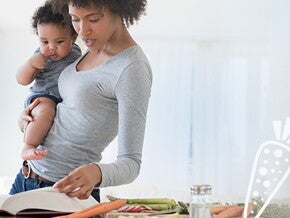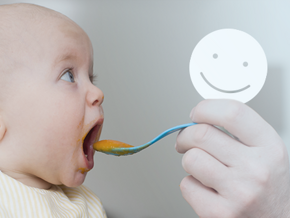
Helping Your Little One Love Good Food
Perhaps one of your most important jobs as a parent is to be a good role model for your baby, particularly when it comes to healthy eating. But just how much of an impact does what you eat and drink now have on your little one’s future?
The benefits of being a healthy role model
- Your baby is more likely to eat a variety of healthy foods—fruits and vegetables, lean meats, whole grains—if they see you eating them too.
- Awakening taste buds to the flavours of fruits and vegetables now means there’s a greater chance they’ll continue to eat them when they’re older.
- If your little one sees you trying and enjoying new foods, they may be tempted to give them a try too.
- By setting an example and drinking water with every meal, your baby will be more inclined to do the same.
How to kickstart healthy-eating habits
Setting the best example for your baby is sometimes easier said than done. Follow these helpful tips for what behaviours to model and those to avoid at the dinner table.

Do serve a variety of colourful fruits and vegetables every day, including at least one fruit or vegetable at each eating occasion. Let your baby choose from a selection.
Don’t get stuck in a rut of only serving foods you know they like.

Do offer your baby sensible-sized portions of healthy food. Let them decide how much they want to eat and offer more if they show signs that they’re still hungry.
Don’t put pressure on your little one to eat ‘one more bite’ as this may encourage eating when they are not hungry, being less interested in food, and being fussier about food.

Do prepare the same meal for everyone at the table. The foods you choose to offer should include some that you know your baby will enjoy. If there is something new as well, it is a chance for them to try it. There is no need to prepare a separate, special meal for your baby. You can always set a portion of healthy foods from the family menu aside for your baby, which you cut up into small bites and leave free of added salt or sugar.
Don’t just offer pureed food to your little one. By 8 months of age, they need to start experiencing a range of different textures.

Do keep a bowl of fruit on the table so your baby can easily point at something they’d like to eat.
Don’t use food as a reward for good behaviour. Bribing your baby with a sweet treat for finishing their vegetables may mean they’ll always come to expect this.

Do let your baby hear you say "I'm full" and then see that you stop eating. Teach your baby how to express that they’re full—with words or gestures—and then respect what they tell you, even if they haven’t finished everything on their plate.
Don’t worry too much if your baby doesn’t eat much at one meal. If they’re hungry, they will make up for it at the next one.

Do try to introduce one or two new fruit or vegetables at least once a week to family mealtimes and experience a journey of new tastes together.
Don’t give up! Just because your baby didn’t like something the first time around, it doesn’t mean they won’t like it in the future.


















